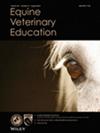Equine tongue tumours: A multicentre retrospective study
Abstract
Background
Tumours of the oral cavity in horses are rare, and because they are not easily visible, their diagnosis is often delayed. Different types of equine tongue tumours have been described, but information about clinical signs, treatments and outcomes is very limited.
Objectives
To identify horses with a confirmed antemortem diagnosis of a tongue tumour and to document their clinical presentation, treatment and outcome.
Study design
Retrospective multicentre study.
Methods
Medical records (1997–2024) from eight specialty or referral practices were reviewed. Horses met inclusion criteria if an antemortem diagnosis of a tongue tumour was made and confirmed by cytology or histopathology.
Results
Thirteen horses met the inclusion criteria. Presenting complaints included one or more of the following: tongue mass (4) or wound (2), difficulty eating (6), external facial swelling (2) and abnormal respiratory noise (2). Tumours were identified as squamous cell carcinoma (SCC) (5), melanoma (2), mast cell tumour (2), anaplastic carcinoma (1), poorly differentiated carcinoma (1), B-cell lymphoma (1) and neuroendocrine tumour (1). Seven of 13 horses (54%) underwent surgical treatment. Five of the seven (71%) had no recurrence for ≥1 year, and two were euthanised earlier for reasons other than tumour regrowth. One mast cell tumour responded to conservative treatment. All horses with SCC were euthanised following palliative or no treatment.
Main limitations
The main limitations are the small sample size, a result of the rarity of the condition and the diversity of performed diagnostics and treatments, a consequence of the multicentre study design.
Conclusion
Horses with tongue tumours frequently present for evaluation of a tongue laceration or mass and biopsy or cytology is required for definitive diagnosis. While the prognosis for lingual SCC was uniformly grave, surgical excision for other types of tongue tumours carried a good long-term prognosis in this study.


 求助内容:
求助内容: 应助结果提醒方式:
应助结果提醒方式:


